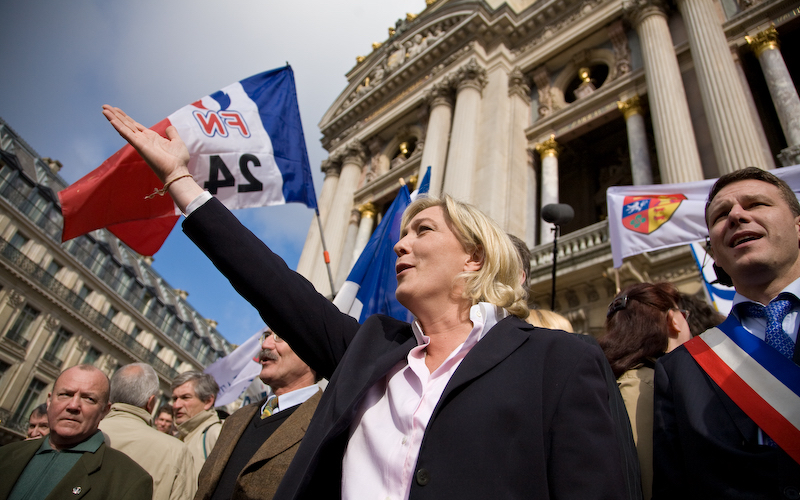
Marine Le Pen Didn’t Win Over Women. Can Anyone on the Far Right?
Marine Le Pen has gone from potentially being elected the first female president of France to barely keeping her party alive.
In early May, Le Pen was one of two candidates to advance to the second round of the presidential election. Two months later, her party – the Front National – lost badly in the French parliamentary elections. While Le Pen won her own first-ever parliamentary seat and the FN’s overall share of the 577-seat assembly climbed from to 2 to 8, these gains are still not enough to form an official parliamentary group.
This outcome is surprising given voter enthusiasm for the National Front earlier this year. Marine Le Pen cultivated this enthusiasm by attempting to shed the National Front’s anti-Semitic, masculine and staunchly conservative image. She used symbols and policy platforms to give her party’s anti-immigrant and eurosceptic positions a modern veneer. She softened the party’s image by replacing its traditional symbol of a red torch with a blue flower. She emphasized her role as a mother, one who could disrupt an all-male political terrain. This feminine touch transformed the party her father founded from a fringe movement to a credible contender for the French presidency.
As scholars of women and politics and especially of women on the right, we are interested in how the National Front and other radical right parties use gender to reach out to female voters. Like other right-wing parties trying to counter their out-of-touch image and broaden their popularity, the FN made two key changes: promoting a women as leader and considering policies that benefit women and other marginalized groups.
Making populism women- and gay-friendly
Right-wing parties feminize to attract new voters, particularly women, because doing so increases their chances of gaining political power. In many advanced industrialized countries, right-wing parties have fallen out of favor with female voters. These parties are often perceived as representing older, white, male voters. Female voters – especially younger and single women – more frequently gravitate toward the left politically.
Consider these examples of how mainstream conservative parties have tried to woo women. In Germany, conservative Chancellor Angela Merkel has endorsed feminist policies, adopting quotas for women on corporate boards and reforming parental leave to grant fathers more time off. The U.K.’s Prime Minister Theresa May, in her prior role of home secretary, wore a “this is what a feminist looks like” T-shirt and helped strengthen sexual violence laws. And in Japan, conservative Prime Minister Shinzo Abe has pushed “womenomics” – raising the number of women in the workforce by equalizing the pay gap and encouraging businesses to hire more women.
Yet Marine Le Pen stands out for leading the feminization of a radical right-wing party. Such parties are typically populist. They position themselves as bulwarks against social change, mobilizing voters who feel frustrated and abandoned. They oppose immigrants, primarily Muslims, whom they see as threatening Western ways of life. Defending a “pure” national identity – and opposing feminism and liberalism – are central to the right-wing populist project. The unlikelihood of a radical right party feminizing makes Le Pen’s efforts noteworthy.
Under Le Pen’s leadership, the National Front no longer proposes to restrict abortion and has softened its approach to LGBTQ issues. It still opposes same-sex marriage, but several LGBTQ individuals recently ascended to high-profile positions within the party.
Anti-Muslim rhetoric has helped the National Front appeal to both women and LGBTQ voters. During the presidential campaign, Le Pen positioned herself as the protector of French women, their defense against Muslim men who she claims threaten women’s rights and liberties. She evoked iconic French feminist Simone de Beauvoir in an op-ed piece, stating “I am scared that the migrant crisis signals the beginning of the end of women’s rights.” Likewise, the party alleges that Muslim immigrants hold anti-gay sentiments that endanger the well-being of the LGBTQ community.
A failed experiment
Yet feminization did little to improve the electoral fortunes of the Front National. Traditional conservative parties like Merkel’s Christian Democratic Union and May’s Tories have benefited from softening their images. But the Front National’s new modern image did not convince French voters. The French instead handed a resounding victory to President Macron’s new centrist party, En Marche (On the Move). A record-high proportion of women were also elected, and women will comprise nearly 50 percent of the En Marche’s parliamentary delegation.
Radical or populist parties face difficulty persuading voters that their commitments to women’s rights and gay rights are sincere, no matter whether women are at the helm or not. The question remains whether populist right parties will double-down on this modernization strategy as the electoral tide turns against them.
Next up in the Western European electoral calendar is Germany, where the ultra-right Alternative for Germany expects to win 8 percent of the vote. Women lead this party as well. The top candidates are Alice Weidel and Alexander Gauland, and the party leaders, Frauke Petry and Jorg Meuthen, also form a gender-balanced duo. Weidel has come out as a lesbian. And while she and other LGBTQ party supporters are more concerned about the euro crisis or immigration than sexual identity politics, the presence of women and gay leaders gives these parties an important veneer of modernity. Whether their presence will attract more voters remains to be seen.
This article was originally published on The Conversation. Read the original article.

